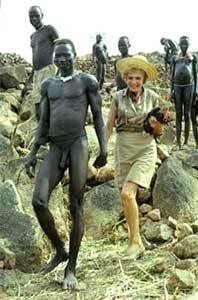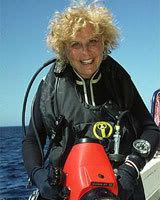Time for another Olympic post, but this one slightly less about the Olympics than my previous post on Walk Don't Run. The 1938 documentary Olympia is the famous record of the 1936 Berlin Olympics, directed by Leni Riefenstahl. Riefenstahl (1902-2003) is the highly controversial director who made not only Olympia, but the propaganda movie Triumph of the Will, about the 1934 Nazi Party Congress in Nuremberg. Possibly the best starting point for learning more about the life and work of Riefenstahl is the German documentary made in honor of her 90th birthday in 1992 and containing extensive interviews with her, Leni Riefenstahl: The Power of Images. (Note that the movie has also gone under the title The Wonderful Horrible Life of Leni Riefenstahl.)
In this fascinating three-hour movie, we learn that Riefenstahl really lived four lives in one. Born in 1902, she became an actress on the Berlin stage of the early 1920s, a relatively liberated era of the Weimar Republic. This led her into becoming a movie actress, and making several silent films in a genre known as "mountain movies", with some of the famous titles in the genre being The Holy Mountain and The White Hell of Piz Palü, both of which are available on DVD. Perhaps the most interesting thing for us modern viewers about these movies is that the actors did their own stunts, which was very difficult on them.
Riefenstahl wanted to do more than act in the "mountain movies", so she decided to become a director. Her 1932 movie The Blue Light gained her the notice of the Nazis, who asked her to direct the record of the Nazis' 1933 party congress. This was a shorter movie called Victory of Faith, and apparently so impressed certain members of the Nazi Party that they asked her to make what would eventually become Triumph of the Will, about the 1934 Party Congress.  This is by far the most controversial part of Riefenstahl's career, and in the interviews she did she is given ample opportunity to explain and defend the work she did on behalf of the Nazis. Suffice it to say that I personally find it interesting, but unsurprising, that Riefenstahl comes in for much more criticism for pro-Nazi propaganda than do the makers of pro-Communist propaganda such as Aleksander Dovzhenko and his 1930 movie Earth. Olympia came about as a result of the success of Triumph of the Will. Riefenstahl claims she was reluctant to make another movie directly for the Nazis, but claims she made it on the express condition that they not ask her again to make another movie for them. (In point of fact, she didn't direct another movie during the Nazi period.) Riefenstahl also claims that many of the cinema techniques she wanted to use, both in Triumph of the Will and Olympia, were vehemently opposed by some of the powers that be, notably Joseph Goebbels, the Nazis' Propaganda Minister.
This is by far the most controversial part of Riefenstahl's career, and in the interviews she did she is given ample opportunity to explain and defend the work she did on behalf of the Nazis. Suffice it to say that I personally find it interesting, but unsurprising, that Riefenstahl comes in for much more criticism for pro-Nazi propaganda than do the makers of pro-Communist propaganda such as Aleksander Dovzhenko and his 1930 movie Earth. Olympia came about as a result of the success of Triumph of the Will. Riefenstahl claims she was reluctant to make another movie directly for the Nazis, but claims she made it on the express condition that they not ask her again to make another movie for them. (In point of fact, she didn't direct another movie during the Nazi period.) Riefenstahl also claims that many of the cinema techniques she wanted to use, both in Triumph of the Will and Olympia, were vehemently opposed by some of the powers that be, notably Joseph Goebbels, the Nazis' Propaganda Minister. Everybody knows that Hitler eventually started World War II, which the Nazis lost. After the war there was an intensive process of denazification, with anybody perceived to have Nazi ties being blacklisted, a fate that befell Riefenstahl as well. Not being allowed to make movies, she took up photography, eventually spending a substantial amount of time with the Nuba tribe in what is now southern Sudan, taking photographs of them. She was obviously still obsessed with the human form as she had been when she made Olympia two decades earlier, and one of the results is that her book of photographs was almost as controversial as her propaganda movies for the Nazis.
Everybody knows that Hitler eventually started World War II, which the Nazis lost. After the war there was an intensive process of denazification, with anybody perceived to have Nazi ties being blacklisted, a fate that befell Riefenstahl as well. Not being allowed to make movies, she took up photography, eventually spending a substantial amount of time with the Nuba tribe in what is now southern Sudan, taking photographs of them. She was obviously still obsessed with the human form as she had been when she made Olympia two decades earlier, and one of the results is that her book of photographs was almost as controversial as her propaganda movies for the Nazis.
Finally, when she was 70 years old, she took up another aspect of filmmaking: underwater photography.  She claimed to be just 50 years old in order to be able to take scuba lessons, and having gotten a scuba certificate, proceeded to make documentary work about undersea life, which she was still doing into her nineties, at the time this movie was made. At least this time, for her sake, the subject material was rather less controversial. Still, it's striking to see just how interested a director can be in form and composition.
She claimed to be just 50 years old in order to be able to take scuba lessons, and having gotten a scuba certificate, proceeded to make documentary work about undersea life, which she was still doing into her nineties, at the time this movie was made. At least this time, for her sake, the subject material was rather less controversial. Still, it's striking to see just how interested a director can be in form and composition.
Leni Riefenstahl: The Power of Images is available on DVD, and even with a three-hour running time, is an excellent movie about one of the most fascinating, complex, and controversial figures of cinema history. I can highly recommend it, and would tell everyone to watch it and judge for themselves exactly how guilty Riefenstahl was or wasn't of complicity with the Nazis.
Paul Muni
11 hours ago

No comments:
Post a Comment